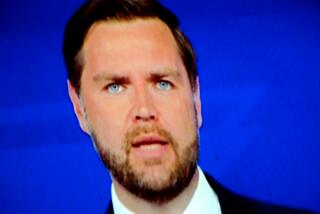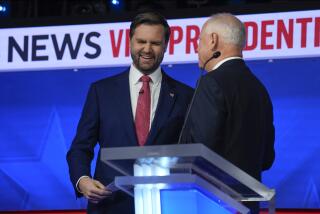Picking a Proper Vice President: Casting Call Across the Area Codes
- Share via
WASHINGTON — As candidates for the presidency fall away, attention begins shifting to prospective running mates.
The day before his Super Tuesday blowout, Vice President George Bush said if his staffers were even thinking about it, he’d “kick ‘em.” It would be “presumptuous and arrogant,” he said, to get into the “pure politics of dangling the vice presidency.” Translation: Don’t waste the bait.
Yet a high-level Bush staffer confided 10 days earlier, “Bush has given more thought to the vice presidential nomination than most people--for obvious reasons.” The Bush short list includes California Gov. George Deukmejian, Colorado Sen. William L. Armstrong, Illinois Gov. James R. Thompson and former Tennessee Gov. Lamar Alexander.
The morning after Super Tuesday, when Massachusetts Gov. Michael S. Dukakis was asked if the Rev. Jesse Jackson might be his running mate, he said he hadn’t thought about it. Confirming this the next day, his spokesman claimed, “We’re not ruling anybody in, and we’re not ruling anybody out.”
If Dukakis really hasn’t thought about it, he ought to--quickly. As Missouri Rep. Richard A. Gephardt’s press secretary, Ali Webb, said the same day, “The vice presidential spot is absolutely critical for Democrats this year.”
Considering the history of the office over the past 40 years, it is critical for all of us. The vice presidency has produced four of the past eight Presidents, several unsuccessful nominees and probably the 1988 GOP contender. This year, the choice is more significant for Republicans. Although the age issue has been driven underground by two successful Ronald Reagan campaigns, the fact remains that Bush, at 64 next year, would be two years older than Dwight D. Eisenhower was at his first inauguration.
The ultimate Republican dream ticket would be Bush and Dole: George and Elizabeth, that is. With a single stroke, Bush could unify the party, solidify his Southern strength and attract women from the Democratic Party with a credible female running mate. Yet this is almost certainly too potent to be possible.
Rep. Jack Kemp of New York, the GOP’s emerging good guy, was miniaturized alongside Republican Senate Leader Bob Dole and the vice president. His single digit standings in race after race used him up this year, probably. No other GOP primary contenders need apply.
On Bush’s supposedly secret short list, Republican governors abound, partly because it is smart to flatter such people before their states’ primaries, and partly because the GOP cannot afford to lose even one senator next year.
Deukmejian, who might have been needed in a June race against Dole, is known east of the Rockies only vaguely for having stood firm against raising state taxes. As a regional candidate, he is superfluous--if Reagan campaigns for the Republican ticket as vigorously as expected.
Colorado’s Armstrong, rated by the liberal Americans for Democratic Action at a pristine zero, was perhaps once a fallback choice if Pat Robertson had become a threat. The former television evangelist was, himself, unthinkable.
“Big Jim” Thompson, the four-term, racket-busting Midwesterner, endorsed Bush in the critical Illinois primary. That cracked the Dole candidacy. Selection of Thompson would signal a radical Bush shift to the center; the Illinois governor, endorsed by the Illinois AFL-CIO in 1986, is one of the last important, incumbent liberal Republican left alive. At the very least, he should expect to be named attorney general in a Bush administration.
The Southern prospect, Alexander, built his two-term reputation on progressive policies in education and foreign trade. Choosing him would take Dukakis down a notch on the leadership issue. The Massachusetts governor, who likes to brag about his election as chairman of the National Governors’ Conference, succeeded the Tennessean in the job.
One Democratic version of the dream scenario for a ticket has Dukakis meeting with Jesse Jackson and Albert Gore Jr. in a presumably nonsmoking room. Dukakis says, “What do you think?” Jackson replies, “Name Al Gore your running mate.” And everybody lives happily ever after.
But pairing Dukakis and Gore for victory is likely to be as problematic as mating pandas at the National Zoo. Neither seems suited to the passive role, and Gore’s savaging of Dukakis as “unelectable” would be a recurring theme in GOP attacks next fall.
Gore himself disclaims any interest in veephood--nor has he picked one. His press secretary, Arlie Schardt, said after Super Tuesday, “There hasn’t been any talk or planning--really not a word of discussion of this.”
Gephardt may be available before the end of the month. He faces a special dilemma three days after the important Michigan caucuses next Saturday: he must file for reelection or give up his House seat.
The real wild card, of course, is Jackson, who has never ruled out the vice presidency. But all the stories about the new, conciliatory Jackson reflect a certain amount of wishful thinking and ignore what the candidate himself says: “The question of my brokering role is an insult to the integrity of this campaign.”
More, a long-time Jackson intimate, reflecting on the lack of enthusiasm among some black leaders, estimates that as many as 30% or 40% of Jackson’s delegates are ringers poised to desert him on a third ballot. They might then place Georgia Sen. Sam Nunn in nomination, paving the way for a potential Dukakis-Nunn ticket.
Among the Democratic Hamlets, including New York Gov. Mario M. Cuomo and New Jersey Sen. Bill Bradley, Nunn could add the needed regional appeal to a Dukakis ticket. The owlish Georgian’s low-key drawl would be perfect counterpoint to the staccato Dukakis delivery, which has a smart-alecky ring to Dixie ears. Nunn’s endorsement of Gore only shows he needs Dukakis less than Dukakis needs him.
The Democrats have a whole phone book of choices from a variety of area codes. All camps except Jackson’s agree that geographical balance matters. House Speaker Jim Wright of Texas, Rep. Patricia Schroeder of Colorado, Rep. William H. Gray III of Pennsylvania, Sen. Tom Harkin of Iowa, Sen. Dale Bumpers of Arkansas and Boston Mayor Raymond Flynn have been mentioned by Jackson people. Other camps name, among a cast of dozens, Los Angeles Mayor Tom Bradley, San Antonio Mayor Henry Cisneros (his wife endorsed Dukakis), Seattle Mayor Charles Royer (he endorsed Dukakis himself), former San Francisco Mayor Dianne Feinstein and Arkansas Gov. Bill Clinton.
Choosing a running mate has been a quirky, personalized, often last-minute process in modern American politics. Veteran pollster Charlie Roll remembers that George Gallup believed that no vice presidential nominee was likely to add more than 3 percentage points to a ticket but that the potential for disaster was virtually limitless. Who can forget the choices of Sen. Thomas F. Eagleton and Rep. Geraldine A. Ferraro? Now, Roll warns, “nothing’s changed.”
More to Read
Get the L.A. Times Politics newsletter
Deeply reported insights into legislation, politics and policy from Sacramento, Washington and beyond. In your inbox twice per week.
You may occasionally receive promotional content from the Los Angeles Times.










